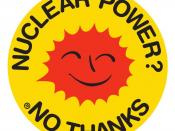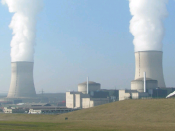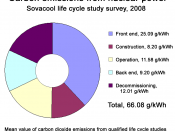27/6 THE NUCLEAR POWER DEBATE
In 1953, nuclear energy was introduced into America as a cheap and efficient energy source, favoured in place of increasingly scarce fossil fuels which caused air pollution. Its initial use was welcomed by the general public, as it was hoped to lower the price of electricity, and utilise nuclear power for it's potential as a resource, not a weapon. However, as people became aware of the long term dangers involved in storing nuclear waste, it's use was criticised. Two accidents, at Three Mile Island and Chernobyl, demonstrated to the world the enormous risks involved in producing nuclear power.
Nuclear power provides 17% of the world's electricity but coal is the main source, making up 39%. However, fossil fuels such as coal, require greater quantities to produce the equivalent amount of electricity produced from Uranium. The use of nuclear power opposed to burning fossil fuels has reduced carbon dioxide emissions by 2 billion tonnes per year, minimising the global warming effect on the atmosphere.
Carbon dioxide is responsible for half of man made gases contributing to the Greenhouse Effect, and has sparked action from the UN Intergovernment Panel on Climate Change. Their consensus is a concern for the environment in the next century if fossil fuels continue to be used, even at present global levels. The Panel claims that for carbon dioxide to be stabilised to safe levels, a 50-80% reduction in all emissions would be required.
The United Nations has predicted a world population growth from 5.5 billion to 8.5 billion by the year 2025, meaning demand for energy will increase. Nuclear power is the only practical source, in consideration for the environment, cost and efficiency. Coal-fired generation of electricity would increase carbon dioxide emissions, and renewable sources such as solar and hydro, are...


